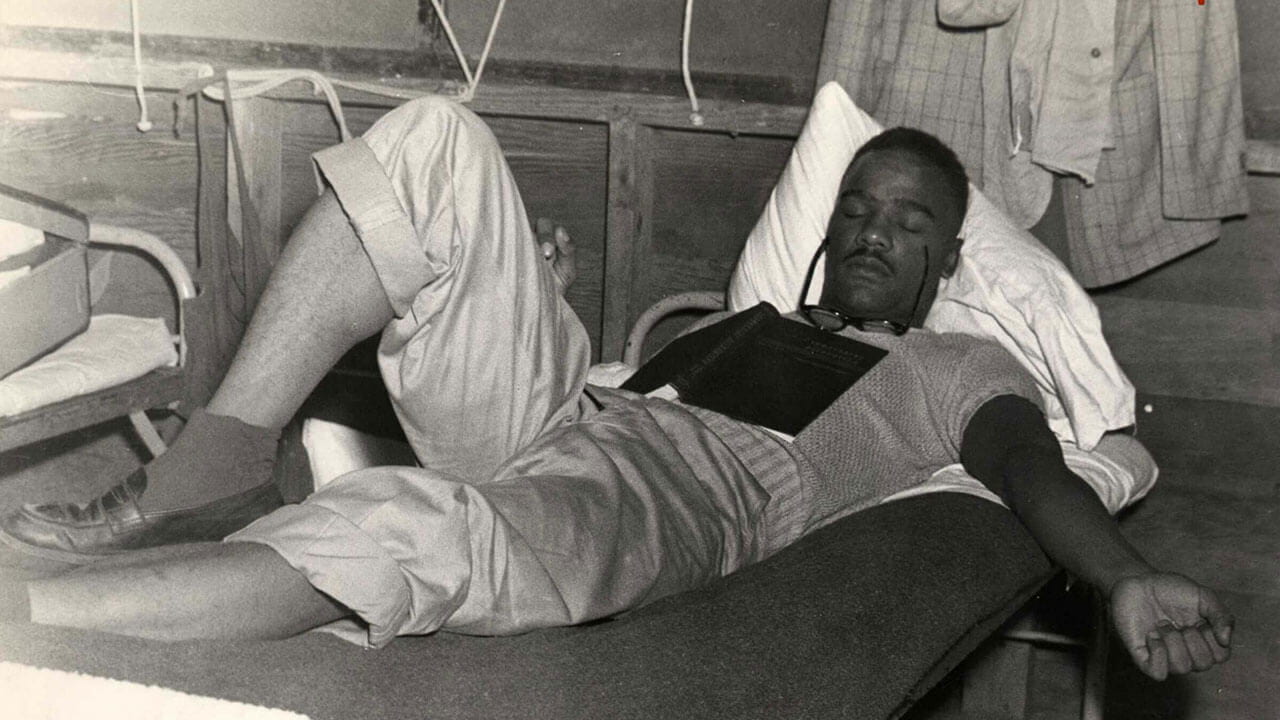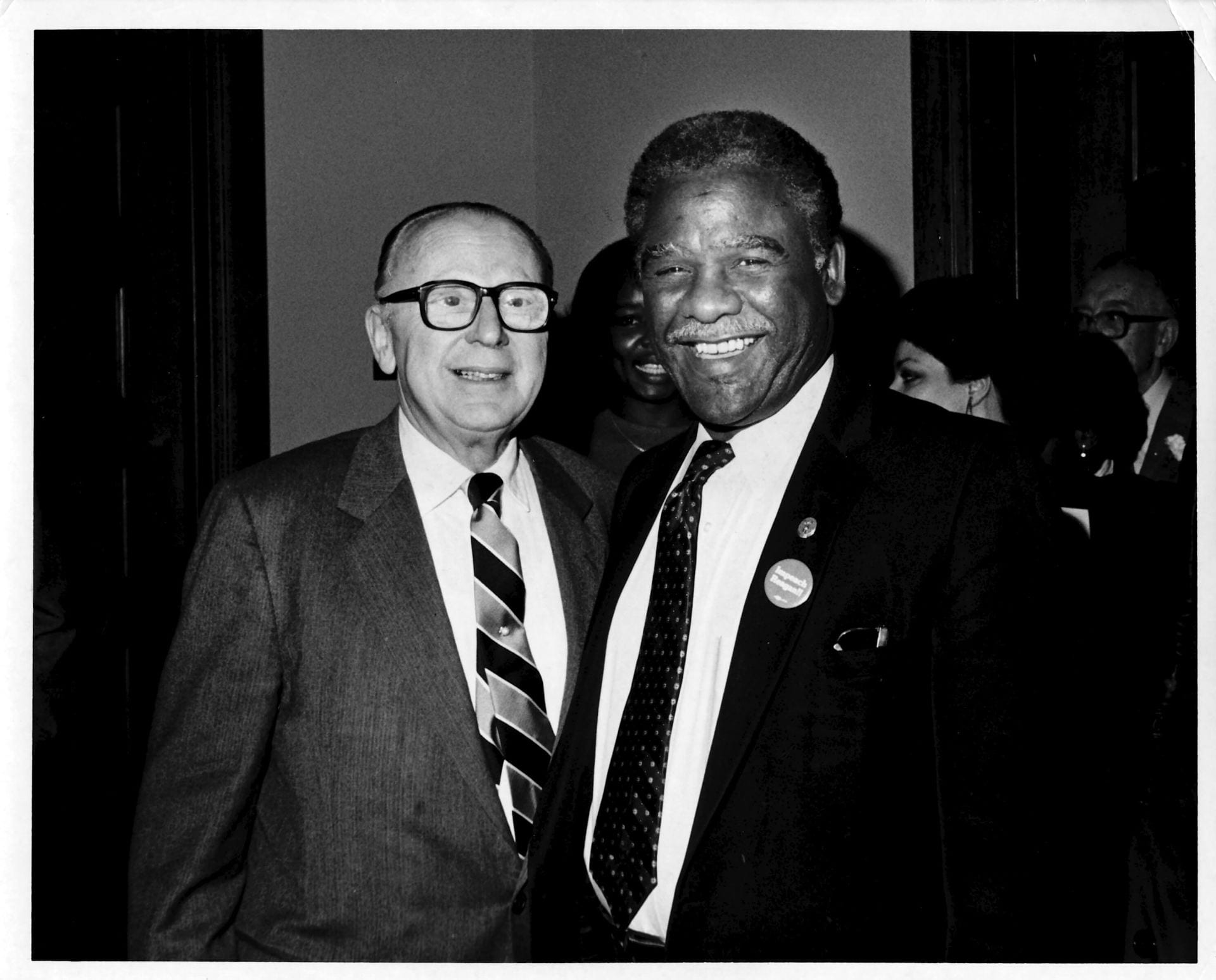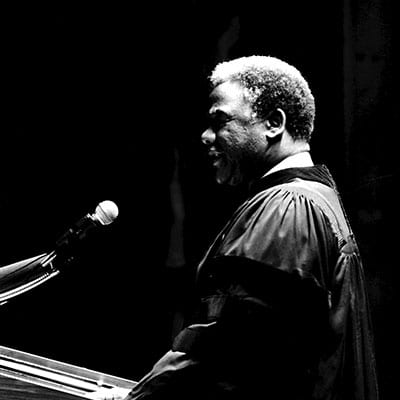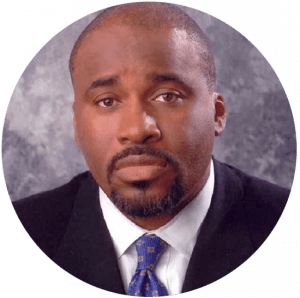A Hand Up
The Lasting Legacy of Harold Washington in Public ServiceConversation with Trustee Terry Peterson (MPA ’95)
As a college student, alum and trustee Terry Peterson (MPA ’95) watched from DeKalb as Harold Washington campaigned to become Chicago’s first Black mayor. He ran on a campaign that promised to reform the broken patronage system and bring more jobs to the city.
Bolstered by thousands of new voters on the South and West Sides, Washington won the Democratic primary, then the general election.
For Peterson, Washington inspired what would become more than 30 years of public service. He served as alderman of Chicago’s 17th Ward, led a $1.5 billion initiative at the Chicago Housing Authority, and chaired the Chicago Transit Authority board.
As a member of the Harold Washington Legacy Committee, Peterson hopes to uphold the memory of the People’s Mayor for another generation. He spoke to Roosevelt about public service and his hopes for a more fair Chicago.

Harold Washington takes a nap at Roosevelt University summer camp in the 1940s.
What inspired you to go into public service?
Harold Washington’s legacy had a huge impact on going into public service. What stands out to me is how he was always willing to fight for the poor: jobs, housing, education. Always talking about how to lift up communities.
I grew up on the South Side and I was the oldest of three. My mom worked 16 hours a day, and we had neighbors who looked after us. Growing up in the Washington Park community, I realized the importance of looking out for your neighbors and working together to create a better quality of life for the entire community. Whatever success I’ve had in my career, would have never happened if not for people supporting and pushing me to succeed.
When I started working in the alderman’s office, I realized it was a big deal if I could tear down an abandoned building next door to a family with three young kids. By tearing down the abandon building, it provided a sense of safety for the family. It was a big deal for seniors to get streetlights turned on, so that they could feel safe coming and going in the community. By serving, I can pick up the phone and change someone’s quality of life.
I was one of the many young people who got into politics after the passing of Mayor Washington. He was a North Star for a lot of us in terms of public service.
How did early lessons from Washington and your mentors shape your perspective as an alderman?
Mayor Washington was as comfortable on the southside in Englewood as he was on LaSalle Street in the financial district. It’s a special person that can walk into different communities and be genuine and at ease.
It was inspiring to see a Black man, someone who looks like me, who felt comfortable in multiple environments. He never strayed from his responsibility to the communities that were left behind.

Mayor Harold Washington (right), wearing an Impeach Reagan button, poses with Roosevelt president Rolf Weil.
Washington would continue participating in the city’s Black political leadership, which proved to be a training ground for his political future
By the time I first met Washington, he had run for political office and was a state representative in the Illinois General Assembly. At Kennedy King Junior (now community college), Washington spoke to my Introduction to Political Science class. He explained to us his role in state government and how it impacts each of us on a daily basis. A master of words, hearing him speak always reminded me of the eloquence of the Rev. Dr. Martin Luther King, Jr.
The next time I heard of Washington, he was running for mayor.
I would encourage young people to find people that you admire as your mentors. I was fortunate to have a boss in Mayor Daley who was also a friend and a mentor. I’ve been blessed and fortunate to have people in my life who encourage and supported me throughout my life. I truly believe that if you help other people, you will be blessed as well.
In his 1984 Commencement address, Washington said:
“Our graduates are the inheritors of a great tradition and are charged with an even greater mission — to continue to seek the goals of enlightenment and reform.”
How did your education mold your perspective on social justice and reform?
My time at Roosevelt was a great experience and helped shape me into the person I’ve become. The professors were absolutely incredible, in terms of their nurturing, mentoring and spirit about public service.
A good example: When I started working on my master’s degree in public administration at Roosevelt University, I met Richard Hatcher, the former mayor of Gary, Indiana. He was the first African American Mayor of a major African American city back in the ’60s. He became a mentor and encouraged me to pursue my master’s degree in public administration.
Even after I left Roosevelt, so many of the professors stayed involved in my life and my career. When I was the CEO of the Chicago Housing Authority, I had an opportunity to meet with President Charles Middleton and members of his administration to discuss partnering with the Chicago Housing Authority. As a result, Roosevelt offered two scholarships per year to public housing residents.
I’ve been blessed to serve on the board even after leaving Roosevelt. This institution was so important to my personal and educational growth. Roosevelt is one of those pipelines of future leaders who will go out into the world with the right spirit, mindset and work ethic to make a difference.
Harold Washington campaigned as a mayor for all of Chicago who would challenge unequal resources. In your career, how have you seen overlapping inequities persist?
In 2000, Mayor Daley asked if I would become CEO of the Chicago Housing Authority. With public housing, you’re talking about the poorest of the poor in our city. The agency served residents who were living in a city but had little access to the benefits or services of the city. The Chicago Housing Authority was like a city within a city. It had its own park district programs, schools, human services, police and street and sanitation department.
During my 6 years as CEO of the Chicago Housing Authority, we tore down public housing high-rise projects with a goal of creating mixed-income communities for public housing residents. While we worked hard at achieving this goal, I’ll be the first to say it wasn’t perfect. However, I am proud to say that during my tenure, we had only one objective which was to improve the quality of life for public housing residents, and I think to some extend we were able to accomplish that.

Harold Washington addresses Roosevelt University graduates at the 1984 Commencement Ceremony
I’ll give you another example. At one of the CTA board meetings, we heard a presentation from social service organizations regarding the percentage of homeless children in the city who just needed access to public transportation at a discount to get to school and get home. The CTA board worked with CTA senior management to think through solutions to help reduce fares and reduce barriers for these kids.
At Rush University Medical Center, we did a study and discovered that residents who lived in the downtown loop area live on average 16 years longer than residents who lived on the westside of Chicago. As a result, Rush reached out to community organizations and others to come together and form partnerships to work on reducing that life expectancy gap.
Some of the inequities that contributed to that life expectancy gap consisted of access to quality health care, affordable housing, transportation and jobs. Basic things that we sometimes take for granted.
What gives you hope for a more fair Chicago?
If you stay close to committed people, you understand why it’s a marathon and not a sprint. There are always opportunities to work together to make a difference in the life of others. There are so many unsung heroes and community residents who do this day in and day out through this city.
 Terry Peterson served as vice president of corporate and external affairs at Rush University Medical Center, working with providers, government and community leadership to address healthcare inequities. He was appointed as chair of the Chicago Transit Authority board, where he worked closely with CTA senior leadership on business and policy matters.
Terry Peterson served as vice president of corporate and external affairs at Rush University Medical Center, working with providers, government and community leadership to address healthcare inequities. He was appointed as chair of the Chicago Transit Authority board, where he worked closely with CTA senior leadership on business and policy matters.
As CEO of the Chicago Housing Authority, Peterson led a $1.5 billion effort to transform public housing into safe, low‐rise mixed‐income communities. As alderman of Chicago’s 17th Ward, Peterson generated more than $200 million in development and infrastructure improvements for the Auburn‐Gresham and Englewood communities.
